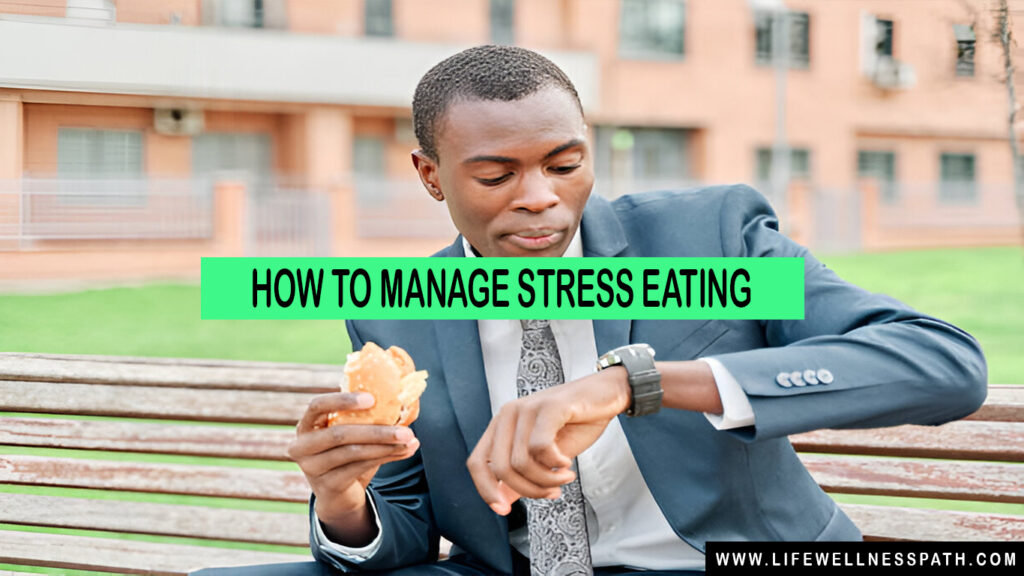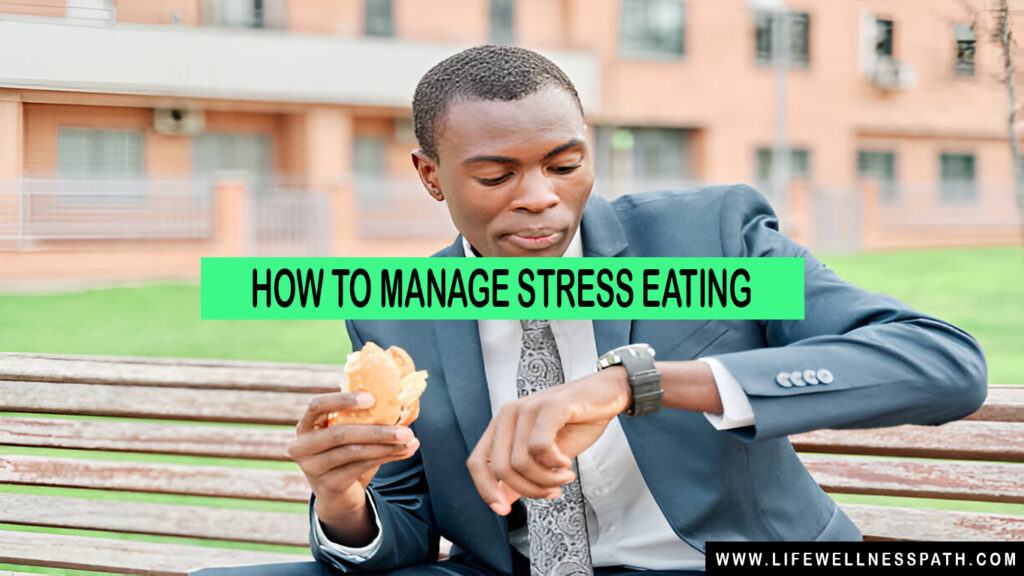Table of Contents
Understanding Stress Eating: Why We Turn to Food in Stressful Times
Stress consuming is not unusual, frequently sneaking up when life receives excessive. For many, strain and meals are tangled—reaching for a fave snack can experience comforting. But have you ever questioned why food becomes a pressure reliever? This dependency often begins because food, particularly excessive-fat or sugary alternatives, can cause the discharge of dopamine, a “sense-proper” hormone. Our brains begin associating meals with pressure comfort, main to repeated stress-eating cycles.
The more we rely on meals to assuage pressure, the more deeply ingrained this dependency becomes. Recognizing this pattern is the first step. By understanding why pressure drives us to consume, we will start identifying alternative, healthier ways to cope.

Identifying Emotional Triggers for Stress Eating
Recognizing specific triggers is critical in learning how to manipulate strain consuming. Emotional triggers vary broadly, which includes boredom, tension, loneliness, or even excitement. Sometimes, the urge to snack may be approximately covering uncomfortable feelings instead of starvation.
To recognize your triggers, recall maintaining a food magazine. Write down while, what, and why you experience compelled to devour. This allows you track emotions, stressors, and any rising styles. Knowing what units off strain consuming can empower you to take preventive steps.
Physical vs. Emotional Hunger: Learning the Difference
Not all hunger is created equal! Physical hunger builds gradually, accompanied through hunger pangs or low electricity, at the same time as emotional hunger regularly hits abruptly. When careworn, emotional hunger can experience pressing, regularly yearning specific consolation meals.
Recognizing those differences can forestall you from complicated emotional starvation with the actual factor. The next time you experience an urge to eat, pause and ask yourself: “Am I genuinely hungry, or am I simply feeling harassed?”
Understanding the Health Impact of Stress Eating
Stress consuming can experience harmless, but it often ends in weight advantage, digestive problems, and coffee power ranges. Eating high-calorie, low-nutrient meals often taxes the body, impacting ordinary fitness.
Beyond the bodily effects, stress consuming also can take a toll on mental health. Feelings of guilt or shame regularly observe a stress-ingesting episode, that could deepen pressure and perpetuate the cycle. Understanding those impacts is a powerful motivator to make healthy changes.
Breaking the Comfort Food Cycle
Comfort ingredients are popular pressure move-toss because they devise short-term alleviation. However, constantly achieving for excessive-sugar or high-fat snacks can deepen reliance on these foods.
To damage this cycle, attempt incorporating comforting yet more healthy alternatives. Swapping out chips for crunchy greens or using Greek yogurt rather than ice cream can preserve comfort without sacrificing your goals.
Practicing Mindful Eating for Stress Management
Mindful eating is an important tool in dealing with stress eating. By focusing on the taste, texture, and aroma of your food, you’re much more likely to devour handiest what your frame desires.
Mindful consuming can be as simple as taking some deep breaths earlier than ingesting, tuning into every bite, and ingesting without distractions like your cellphone or TV. These steps help shift your attention from strain to the food itself, making it easier to stop when satisfied.
Quick Mindful Eating Exercises
Incorporating mindful consuming exercises into each day existence could make a big distinction. Start by using pausing before every meal and putting a purpose, like “I will experience this food completely.”
Another exercising is the “5 Senses” method, wherein you take a few moments to examine the meals’ look, texture, smell, taste, and sound. These sporting activities make meals an experience and decrease the impulse to devour mindlessly.
Reframing Negative Thoughts Around Eating
Negative self-talk regularly fuels pressure eating, developing an intellectual loop that’s tough to interrupt. Common thoughts like “I can’t prevent snacking” or “I’m a failure for strain consuming” make it more difficult to regain control.
Instead, try reframing those thoughts positively. Replace “I can’t control my cravings” with “I’m studying to apprehend my cravings.” Positive affirmations help shift your attitude, setting the level for more healthy picks.
Healthier Alternatives to Common Stress Foods
Stress eating regularly entails dangerous ingredients due to the immediate comfort they create. But what if we should swap them out for more healthy alternatives that also satisfy?
For salty cravings, attempt roasted chickpeas or air-popped popcorn. For something sweet, attain for fruit or darkish chocolate. Having nutritious alternatives handy can preserve strain eating from derailing your wellness dreams.
Setting Boundaries with “Treat” Foods
Setting limitations with treats is important to keep away from overindulging. Instead of denying yourself absolutely, designate a selected time or component for enjoying treats.
For example, allow yourself a small serving of your favorite snack every week. Knowing you could have it now and again reduces the want to consume it all of sudden.
Establishing a Routine to Combat Stress Eating
An established routine facilitates control pressure by bringing consistency on your day. Scheduling meal instances, sleep, exercising, and downtime enables reduce pressure ingesting triggers.
When workouts are in region, we’re much less in all likelihood to reach for food as a filler. Find what works for you—a normal breakfast time or a night wind-down recurring—and construct from there.
Meal Prep as a Tool for Managing Stress Eating
Meal prep takes the guesswork out of eating and continues nutritious foods effectively available. By getting ready food in advance, you’re less in all likelihood to seize something unhealthy when strain strikes.
Start by way of making ready some food and snacks for the week on Sunday. Prepped meals reduce the mental load of deciding what to eat, leaving you greater resilient whilst pressure arises.
Navigating Stress Eating at Work
Work can be a first-rate source of pressure, and place of work snacks are regularly unhealthy. Combat work-associated pressure eating via bringing wholesome snacks and staying hydrated for the duration of the day.
Another tip is to take brief breaks to stroll or stretch. These easy moves assist reduce stress, making it much less possibly that you’ll turn to food for consolation.
Tracking Patterns with a Food Journal
Keeping a meals magazine can reveal patterns for your ingesting conduct. Write down what you eat, when, and how you sense afterward to discover emotional triggers.
This exercise gives insights into why you might crave sure meals and the way distinct moods effect ingesting. Understanding those styles empowers you to make nice adjustments.
The Role of Hydration in Reducing Cravings
Hydration is an often-unnoticed thing of stress management. Dehydration could make us experience tired and hungry, growing the hazard of pressure consuming.
Aim to drink water at some stage in the day, particularly if you experience a yearning coming on. Keeping a water bottle close by can help you stay hydrated and decrease unnecessary snacking.
Benefits of Exercise for Reducing Stress Eating
Physical interest is a effective stress reliever, liberating endorphins that counteract pressure hormones. When we’re active, we’re less likely to attain for meals out of pressure.
Exercise doesn’t have to suggest a heavy exercise; a 15-minute stroll can boost your mood and assist prevent pressure ingesting. Incorporating motion into your day could make a massive difference.
Getting Quality Sleep to Support Your Goals
Lack of sleep can growth stress and cause unhealthy cravings. Quality sleep reduces strain levels and gives you the energy to make healthful selections.
Developing a everyday sleep time table is essential. Create a relaxing bedtime ordinary, restrict screen time earlier than bed, and make sure your surroundings are conducive to properly rest.
Practicing Self-Compassion and Letting Go of Guilt
Guilt is often an unwanted associate in stress eating, making it difficult to break the cycle. Being type to yourself and letting move of guilt can assist.
Remind yourself that everybody reviews setbacks, and progress is the aim, not perfection. A little self-compassion can ease strain, lowering the impulse to consume emotionally.
Strategies for Handling Setbacks
Everyone reports setbacks, and they’re a herbal a part of alternate. When you have a stress-consuming slip, use it as a gaining knowledge of opportunity.
Reflect on what caused the instant and brainstorm methods to approach comparable situations differently next time. This mindset shifts cognizance from “failing” to developing.
The Power of Meditation in Reducing Stress Eating
Meditation calms the mind and may reduce pressure ranges, making it less complicated to withstand cravings. A short while of deep respiration or a quick meditation can clear your thoughts.
Even in case you’re new to meditation, easy respiratory sporting events could make a distinction. Consider beginning with guided apps to increase the dependency.
Simple Relaxation Techniques for Immediate Stress Relief
When stress peaks, having instantaneous rest tools is prime. Try strategies like deep respiration, listening to music, or stretching.
Practicing those strategies frequently enables manage strain immediate, lowering the impulse to attain for food for relief.
Building a Support Network
An aid device may be distinctly useful in handling stress consuming. Share your desires with circle of relatives or buddies who can encourage you.
Consider joining a web group or network in which you may connect to others who proportion comparable desires. Having human beings to talk to could make a big difference.
Using Visualization to Overcome Cravings
Visualization is a powerful technique that will let you overcome cravings and make more healthy choices during worrying instances. The concept is to create an intellectual photograph of your self-succeeding in your dreams, which may be extraordinarily motivating.
When you sense a craving coming on, take a second to close your eyes and photograph yourself reaching for a healthy snack as opposed to indulging in consolation food. Imagine the flavor and texture of the nutritious option, and visualize the delight and energy that comes from making that choice. This mental practice session can create nice associations, making it less difficult to withstand unhealthy options when pressure arises.
Additionally, you could use visualization to see yourself engaging in pressure-decreasing sports, together with going for a stroll or training yoga. By regularly picturing your self-selecting healthier behaviors, you may train your thoughts to prioritize these moves whilst strain strikes.
Enjoying the Journey: Celebrating Small Wins
Managing pressure consuming is a process, and every small victory merit popularity. Celebrating your development reinforces positive behavior and facilitates you live inspired in the long run.
Start through maintaining a journal in which you document your achievements, irrespective of how minor they will appear. Did you choose a salad over fries for lunch? Did you effectively practice conscious eating for the duration of dinner? Each time you’re making a wholesome preference, jot it down! Reflecting on these successes can help you see how far you have come, which can be exceedingly empowering.
You also can have a good time in amusing approaches that don’t contain meals. Treat yourself to a film, bask in a relaxing bath, or spend money on a new workout outfit. These rewards create a fine cycle that encourages you to hold making healthy picks. Remember, progress isn’t pretty much the give up goal; it’s approximately taking part in the adventure along the manner!

Creating a Personalized Plan for Managing Stress Eating
Finally, the important thing to fulfillment in dealing with stress eating lies in creating a customized plan that suits your specific life-style and possibilities. Start by assessing your modern consuming conduct and figuring out precise triggers for strain eating.
Once you have a clearer image, set sensible and conceivable goals. Perhaps goal to practice aware consuming as a minimum three times per week or contain a day-by-day exercise habitual. Write down those desires and place them somewhere seen, like your fridge or desk, as a constant reminder of your commitment to alternate.
In addition to putting desires, consist of coping techniques for your plan. This may want to involve having a list of alternative stress-relief sports, including going for a walk, meditating, or calling a friend. Having those techniques simply to be had could make it simpler to divert your focus faraway from food while strain hits.
Finally, assessment your plan frequently. Life is dynamic, and your needs may additionally trade, so be open to adjusting your techniques and dreams. Your personalized plan is a residing report that need to evolve as you do, guiding you towards a more fit courting with meals and strain.
Conclusion: Your Journey to Managing Stress Eating
Managing stress ingesting is a adventure filled with each demanding situations and triumphs. By knowledge your triggers, practicing mindfulness, and incorporating numerous techniques, you may break the cycle of pressure ingesting and foster a healthier dating with food.
Remember, it’s flawlessly ordinary to enjoy setbacks alongside the way. Instead of viewing them as screw ups, see them as opportunities for boom. With staying power and perseverance, you could navigate pressure with more healthy conduct and make lasting modifications for your life.
By embracing this adventure, you’re now not just operating closer to managing stress eating; you’re cultivating a more balanced and enjoyable lifestyle. So, take a deep breath, and let’s circulate forward collectively—one aware bite at a time!
Read More: 25 Proven Steps How to Achieve Your Fitness Goal: The Ultimate Guide to Success
FAQ’s about: How to Manage Stress Eating
1. What is strain ingesting called?
Stress consuming is frequently known as emotional ingesting or pressure-associated eating. It involves consuming meals as a response to pressure rather than starvation.
2. Why will we eat while harassed?
When we enjoy pressure, our bodies produce hormones like cortisol, that can cause cravings for excessive-calorie, comforting ingredients. Eating those meals can provide brief remedy and feelings of pride, developing a cycle of emotional ingesting.
3. How do you manage pressure eating?
Managing strain eating entails figuring out triggers, working towards mindfulness, and developing healthier coping strategies. Techniques along with journaling, engaging in physical interest, and looking for help can also be powerful.
4. What are the options to pressure ingesting?
Alternatives to strain consuming encompass accomplishing physical activities, working towards mindfulness or meditation, speak me to a friend, or participating in a hobby. These activities can help distract from stress and provide more healthy retailers for feelings.
five. How can I identify my strain consuming triggers?
Keep a food diary to be aware what you eat, when you eat, and the feelings you experience at those instances. This permits you to perceive patterns and specific triggers for your pressure eating.
6. Is stress eating the same as binge ingesting?
While each contain eating in response to emotions, binge ingesting is characterized by means of eating big quantities of food in a quick length, regularly followed by means of feelings of lack of manipulate. Stress eating can vary in frequency and depth.
7. What meals are generally eaten in the course of stress ingesting?
Common ingredients consumed in the course of stress ingesting consist of excessive-sugar and high-fat options, such as chocolate, chips, ice cream, and speedy food. These meals regularly offer short energy and luxury.
8. Can strain ingesting lead to weight benefit?
Yes, frequent strain consuming can lead to weight gain, in particular if it entails high-calorie meals fed on often. This can create a cycle of stress and weight-associated issues.
9. How can mindfulness assist with stress consuming?
Mindfulness encourages consciousness of your thoughts, emotions, and frame sensations. Practicing conscious ingesting can help you apprehend starvation cues, making it less difficult to select more healthy options and avoid emotional ingesting.
10. Are there particular exercises that can help lessen strain?
Physical activities like on foot, yoga, swimming, or dancing can help lessen stress levels. Exercise releases endorphins, which enhance temper and may decrease the desire to consume in reaction to stress.
11. What position does sleep play in pressure ingesting?
Lack of sleep can growth stress hormones and cravings for bad meals, making you more likely to strain eat. Prioritizing accurate sleep hygiene can assist control those cravings.
12. Can drinking water assist lessen strain consuming?
Yes, ingesting water can assist lessen cravings, as dehydration can now and again be mistaken for hunger. Keeping hydrated allow you to sense extra satiated and much less possibly to snack unnecessarily.
13. How can I update bad snacks with more healthy alternatives?
Start by stocking your pantry with healthful snacks, inclusive of end result, greens, nuts, and yogurt. Gradually update your move-to consolation foods with these alternatives, making them easily reachable.
14. What are a few pressure-alleviation strategies to attempt?
Stress-relief techniques include deep respiratory sports, meditation, revolutionary muscle relaxation, and tasty in creative sports. Experiment with one-of-a-kind methods to locate what works nice for you.
15. How can journaling assist manage pressure eating?
Journaling lets in you to specific your emotions and mirror on your consuming behavior. Writing about your emotions let you perceive triggers and broaden healthier coping mechanisms.
16. Is it every day to crave consolation foods during annoying instances?
Yes, craving comfort meals at some point of demanding instances is a not unusual reaction. These foods often provide an experience of nostalgia and brief emotional alleviation.
17. Can therapy assist with pressure eating?
Yes, remedy may be useful for addressing the underlying emotional troubles related to pressure ingesting. Cognitive-behavioral therapy (CBT) is in particular effective in converting idea patterns and behaviors.
18. How crucial is social support in handling stress eating?
Social help is important in managing stress consuming. Sharing your studies with friends or support corporations can offer duty, encouragement, and beneficial techniques for coping.
19. What are some signs that I’m pressure ingesting?
Signs of strain eating include ingesting in reaction to emotions as opposed to starvation, attaining for bad snacks, or feeling responsible or ashamed after ingesting. Recognizing these styles is the first step in the direction of trade.
20. Can I still experience meals even as coping with stress ingesting?
Absolutely! Enjoying food is important, but attention on moderation and more healthy options. Savoring each chew mindfully can beautify your typical consuming experience without falling into strain consuming styles.
21. How can meal making plans assist reduce stress consuming?
Meal making plans allows you’re making intentional meals choices and stops impulsive ingesting. By making ready wholesome food earlier, you may reduce the likelihood of accomplishing for unhealthy alternatives at some point of disturbing instances.
22. Are there unique mindfulness exercises for ingesting?
Yes, physical games like conscious consuming, in which you recognition at the flavor, texture, and aroma of your meals, can decorate your focus of ingesting habits. Additionally, taking some deep breaths earlier than meals can assist floor you.
23. What must I do if I slip up and pressure devour?
If you slip up, don’t be too difficult on yourself. Reflect on the scenario, discover triggers, and recommit to your goals. Each day is a brand-new possibility to make more healthy choices.
24. Can supplements assist with strain management?
Some supplements, like omega-three fatty acids, magnesium, and adaptogens, can also assist support stress control. However, it’s pleasant to seek advice from a healthcare professional before starting any new dietary supplements.
25. How does the surroundings influence pressure consuming?
Your surroundings play a vast position on your eating habits. Having wholesome alternatives seen and on hand whilst minimizing the presence of dangerous snacks can help reduce the chance of stress eating.
26. What are a few healthy comfort meals alternatives?
Healthy comfort food alternatives include air-popped popcorn, dark chocolate, baked sweet potato fries, or home-made fruit smoothies. These options can satisfy cravings without leading to stress eating.
27. Can I use meals as a praise without it turning into pressure consuming?
Using food as a praise may be first-rate, however it’s essential to pick healthy alternatives and no longer rely on food for emotional comfort. Find non-food-related rewards, like taking part in a movie or taking a calming bath.
28. How can practicing gratitude assist with strain consuming?
Practicing gratitude can shift your recognition from stressors to tremendous aspects of your life. This intellectual shift might also help reduce the urge to devour for emotional motives, selling more healthy coping mechanisms.
29. Is there a connection among stress ingesting and intellectual fitness?
Yes, there’s a strong connection between strain consuming and mental health. Anxiety, despair, and strain can cause emotional consuming, so addressing intellectual fitness problems is vital in coping with strain consuming.
30. What steps can I take these days to manage pressure ingesting?
Start via figuring out one trigger for your pressure consuming and choose a more fit coping mechanism for it. Consider journaling, training mindfulness, or conducting physical pastime as immediately steps toward dealing with your conduct.







